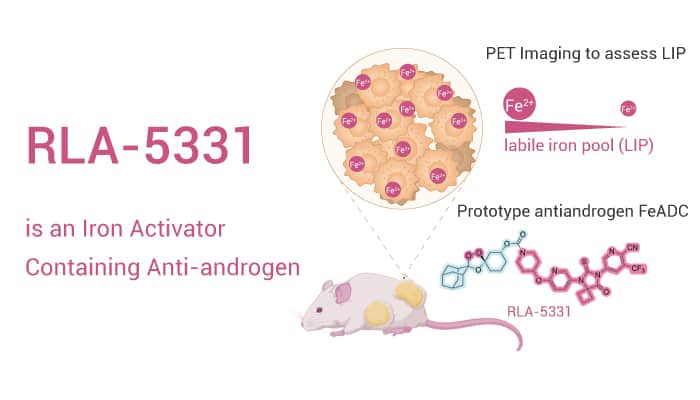Prostate cancer (PCa) is one of the most prevalent malignancies in the world. Depending on the grade of cancer, a variable percentage of these patients experience progression to castration-resistant prostate cancer (CRPC) within 10 years. However, CRPC can develop into metastatic castration-resistant prostate cancer (MCRPC). Research has shown that androgen receptor (AR) overexpression is a key driver in the progression from castration-sensitive disease to mCRPC. In addition, because castration treatments including androgen deprivation therapy (ADT) were ineffective, these cancers still showed reliance upon hormones for androgen receptor (AR) activation. However, metastatic castration-resistant prostate cancer (MCRPC) remains incurable, and the prognosis of these patients is quite poor. And, For men with CRPC, the median survival ranges from 9-30 months. In addition, for men with MCRPC, this survival is reduced to 9-13 months. Thus, we will introduce an iron activator containing anti-androgen, RLA-5331.
RLA-5331 is an anti-androgen-bearing Iron activated drug conjugate (FeADC).

The FeADC leverages the finely tuned, Fe2+-selective reactivity of antimalarial trioxolanes with a linker that couples the Fenton-type reaction with iron to the traceless release of the caged drug payload. Research has shown that elevated Fe2+ is a feature of mCRPC. In other words, elevated labile iron in castration–resistant prostate cancer is targetable with ferrous iron-activatable antiandrogen therapy.
As an Iron Activator, RLA-5331 (5 µM; 0-6 days) shows inhibitory for VCaP, PC3, LNCaP, and C4-2B cell proliferation. And, the antiproliferative effect of these prototype FeADCs is due to the on-target inhibition of AR signaling. In addition, RLA-5331 (5 µM; 24 h) down-regulates the expression level of KLK-2 and KLK-3 in LNCaP cells.
Moreover, mouse pharmacokinetic studies showed that RLA-5331 is stable in vivo and limited exposure to conjugate or free antiandrogen in the brain.
RLA-5331 offers superior efficacy and reduces CNS toxicity when treating mCRPC tumors. In a word, RLA-5331 is a promising anti-MCRPC agent.
Reference:
- Gonciarz RL, et al. Eur J Med Chem. 2023 Mar 5;249:115110.
- He L, et al. Medicine (Baltimore). 2020 Apr;99(15):e19760.